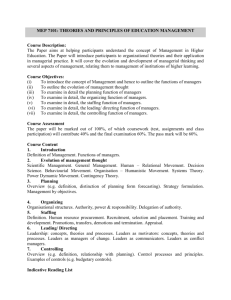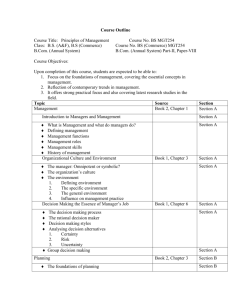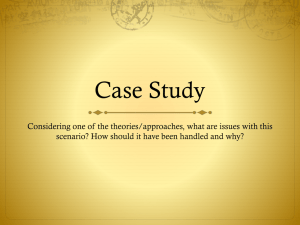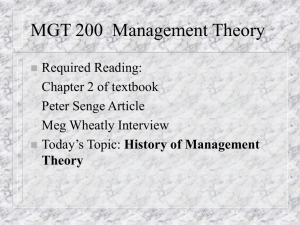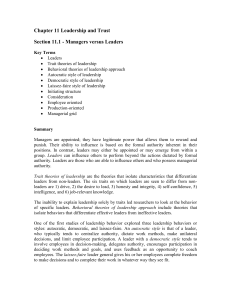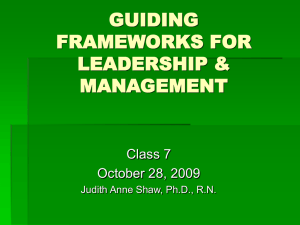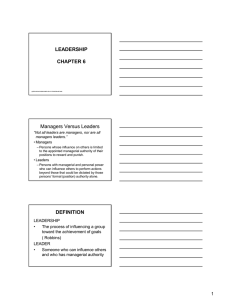Paper-III Principles of Management
advertisement
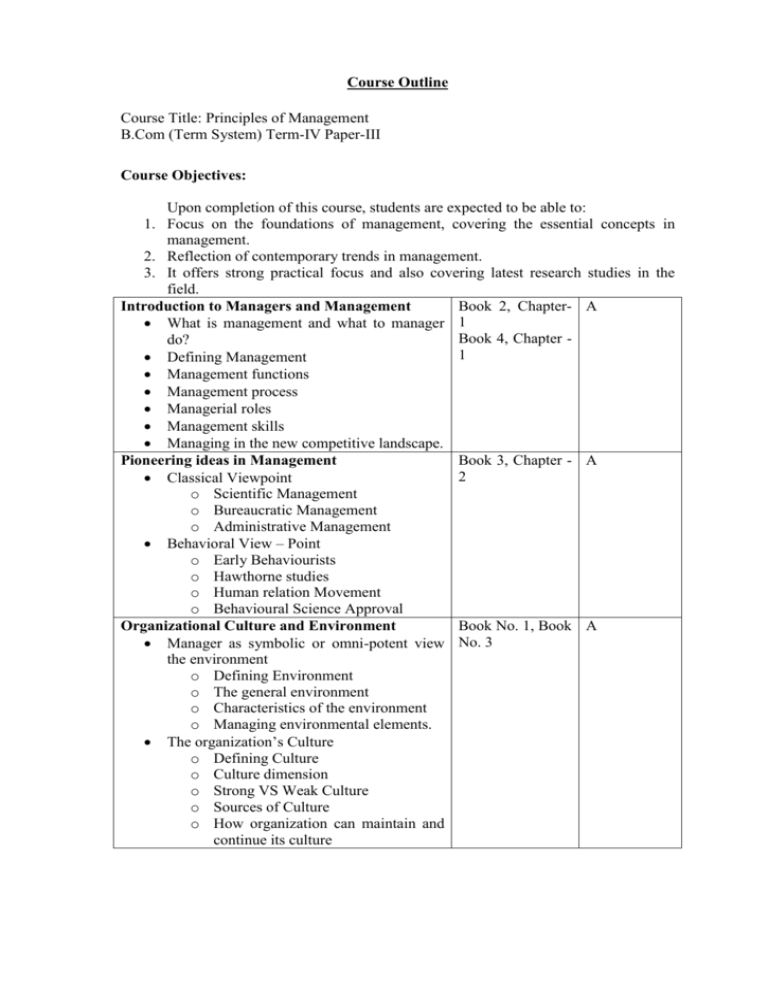
Course Outline Course Title: Principles of Management B.Com (Term System) Term-IV Paper-III Course Objectives: Upon completion of this course, students are expected to be able to: 1. Focus on the foundations of management, covering the essential concepts in management. 2. Reflection of contemporary trends in management. 3. It offers strong practical focus and also covering latest research studies in the field. Book 2, Chapter- A Introduction to Managers and Management What is management and what to manager 1 Book 4, Chapter do? 1 Defining Management Management functions Management process Managerial roles Management skills Managing in the new competitive landscape. Book 3, Chapter - A Pioneering ideas in Management 2 Classical Viewpoint o Scientific Management o Bureaucratic Management o Administrative Management Behavioral View – Point o Early Behaviourists o Hawthorne studies o Human relation Movement o Behavioural Science Approval Book No. 1, Book A Organizational Culture and Environment Manager as symbolic or omni-potent view No. 3 the environment o Defining Environment o The general environment o Characteristics of the environment o Managing environmental elements. The organization’s Culture o Defining Culture o Culture dimension o Strong VS Weak Culture o Sources of Culture o How organization can maintain and continue its culture Decision Making The decision making process The rational decision Maker o Rationality o Bounded Rationality o Intuitive Decision Making Types of problems and types of discusses Decision Making styles Analyzing decision alternatives o Certainty o Risk o Uncertainty Group Decision Making Foundation of Planning The Definition of Planning The purpose of planning Types of plans Contingency Factors in planning Objectives o SMART o Multiplicity of Objectives o Real versus stated objectives o Traditional Objective setting o Management by objectives (MBO) Organizational Structure and Design Defining organization structure and design Building the vertical dimension of organizations Building the horizontal dimension of organizations The contingency approach to organization design. Common Organization design. o Traditional organization Design o Contemporary organization design Motivating employees What is Motivation Motivation process Motivation Theories o Content Theories o Process Theories Leadership Defining leadership Managers vs Leaders Trait theories Behavioral Theories o University of Lowa model o Managerial Grid Contingency Theories Emerging approaches to leadership Sources of powers Book – 1, Chapter A 6 Book 2, Chapter 3 A Book 1, Chapter A 10 Block Chapter, 10 2, B Book 2, Chapter B II Communication Communication and interpersonal skills Understanding Communication Group communication Networks Organizational communication channels o Vertical Communication o Horizontal Communication o Diagonal Communication o Informal Communication (The Grapevine) Controlling Foundation of Control o What is control? o Importance of Control o The Control Process o Types of control o Qualities of effective control Controlling Tools and Techniques o Information Control o Financial Control o Operations Control o Behavioral Control Change Management and Innovation The nature of change and innovation o Distinguishing between change and innovation o Forces for change and innovation The change management and innovation process Resistance to change Managing resistance to change. Managing group and teamwork Foundation of Work Group o What is a group? o Types of work groups. o How informal groups develop o How work groups operate Work Group inputs o Managing diversity: work group composition o Member Roles o Group size Work Group process o Group Norms o Group Cohesiveness o Group development Book 2, Chapter B 3 Book 2, Chapter B 13 Book 3, Chapter B II Book 3, Chapter B 15 Social responsibility and ethics in management Book 3, Chapter B 4 Organizational social responsibility o Major perspectives o Social responsibilities of management o Social stakeholders o Does social responsibility pay? o Types of managerial ethics Recommended Text: 1. Robbins, S.P. & Coulter, Mary (1996). Management: Practice Hall. 2. Robbins, S.P. & Decenzo, David A. (2001). Fundamentals of Management, Pearson. 3. Kathryn M. Bartol, David C. Martin. (Latest Edition) 4. Thomas S. Bateman, SCOTT A. Snell, Management McGraw-Hill. (Latest Edition)
